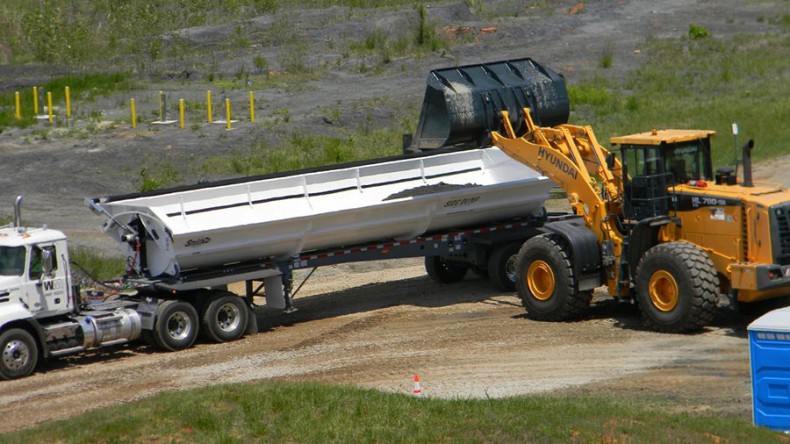Duke Energy Works Through Coal Ash Plans
Recent regulatory changes require new management of coal ash
A side dump truck receives coal ash at Duke Energy's W.S. Lee Steam Station in Belton, South Carolina.
Duke Energy, the investor-owned utility serving many parts of North Carolina, is finalizing plans and cost projections for how it will store and dispose of coal ash to meet recent changes to laws and regulations. Electric utilities across the country are working through similar plans, with coal ash storage facilities in 46 states.
But what is coal ash? When coal is burned to create steam and generate electricity, ash is created and becomes either bottom ash (which falls to the bottom of the boiler) or fly ash (which is driven up with flue gas and captured in filters). The ash has traditionally been stored in unlined basins near power plants. Although the ash has been ruled nonhazardous by the U.S. Environmental Protection Agency, its storage and handling are subject to federal and state regulations.
The most recent regulations related to coal ash began to take shape in 2008 following a coal ash spill from the Kingston power plant in Tennessee. Six years later, a coal ash spill at a Duke Energy plant into the Dan River prompted the North Carolina General Assembly to enact the Coal Ash Management Act (see Coal Ash Management: Why We Are Involved). That initial act was amended in 2016 to, among other things, establish criteria for the closure of each of Duke’s ash basins, in turn preserving environmental goals while reducing costs to retail customers.
Duke Energy has been working through two main coal ash projects: cleanup at the Dan River site, which has been completed, and developing coal ash management plans to meet new federal and state regulatory standards at its 33 basins across the state. Duke Energy is solely responsible for all costs associated with the 2014 spill, but it is seeking to recover costs for regulatory compliance at its other ash storage sites — which it sees as a cost of doing business — from ratepayers at both the wholesale and retail level.
Duke Energy is a long-time supplier of power to electric co-ops in the state. Although North Carolina’s electric co-ops do not own any coal generation, some of the purchased power from Duke Energy does come from coal-fired plants. As a result, North Carolina’s electric cooperatives have been engaged in the coal ash management discussion since the beginning, working to represent the interests of members and ensure that coal ash is managed in an environmentally responsible and cost-effective manner.
Complying with coal ash management regulations will take Duke Energy several years, as it works to improve current basins, cap some basins in place or move ash to new sites. Duke Energy is tracking its progress at duke-energy.com/coalash.
-
Power and the environment
-
Share this story:






